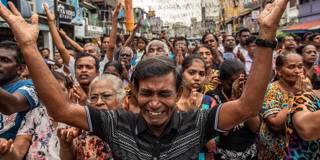There is nothing wrong with nationalism when it is simply a celebration of a country’s best values, traditions, and history. But politicians in Europe and the United States need to be careful that the populist nativism they are stoking does not morph into more violent forms of identity politics, as it has in Christchurch and Sri Lanka.
LONDON – I first visited Sri Lanka as Britain’s development minister in the 1980s, during the early stages of the vicious war between guerrilla fighters – the so-called Liberation Tigers of Tamil Eelam (LTTE) – and Sri Lanka’s armed forces. This bloody ethnic conflict, pitting the largely Hindu Tamil minority against the largely Buddhist Sinhalese majority, surprised those who had previously regarded this beautiful country, with its clever population and its strategic location in South Asia, as a model of Asian democracy. And yet it was here that many of us first heard about suicide bombing, sometimes carried out by children.
The Indian Army had intervened to try to halt the violence. I was flown into the capital of the Tamil territory in the north of the country in an Indian helicopter gunship to see what humanitarian help could be provided. Evidence of the fighting was everywhere to be seen. I recall the systematic destruction of the computer laboratories and other facilities at the University of Jaffna.
Years later, I returned to Sri Lanka as a European Union commissioner to support the Norwegian government’s admirable efforts to end that same conflict. I was taken to see the LTTE’s head, Velupillai Prabhakaran, in his jungle headquarters. A taciturn and sinister fellow, Prabhakaran was not very interested in the peace terms that Norway, supported by the EU, was proposing. The other highlight (or maybe it was a lowlight!) of my visit was being burned in effigy by Sinhalese extremists for suggesting peace talks at all.

LONDON – I first visited Sri Lanka as Britain’s development minister in the 1980s, during the early stages of the vicious war between guerrilla fighters – the so-called Liberation Tigers of Tamil Eelam (LTTE) – and Sri Lanka’s armed forces. This bloody ethnic conflict, pitting the largely Hindu Tamil minority against the largely Buddhist Sinhalese majority, surprised those who had previously regarded this beautiful country, with its clever population and its strategic location in South Asia, as a model of Asian democracy. And yet it was here that many of us first heard about suicide bombing, sometimes carried out by children.
The Indian Army had intervened to try to halt the violence. I was flown into the capital of the Tamil territory in the north of the country in an Indian helicopter gunship to see what humanitarian help could be provided. Evidence of the fighting was everywhere to be seen. I recall the systematic destruction of the computer laboratories and other facilities at the University of Jaffna.
Years later, I returned to Sri Lanka as a European Union commissioner to support the Norwegian government’s admirable efforts to end that same conflict. I was taken to see the LTTE’s head, Velupillai Prabhakaran, in his jungle headquarters. A taciturn and sinister fellow, Prabhakaran was not very interested in the peace terms that Norway, supported by the EU, was proposing. The other highlight (or maybe it was a lowlight!) of my visit was being burned in effigy by Sinhalese extremists for suggesting peace talks at all.